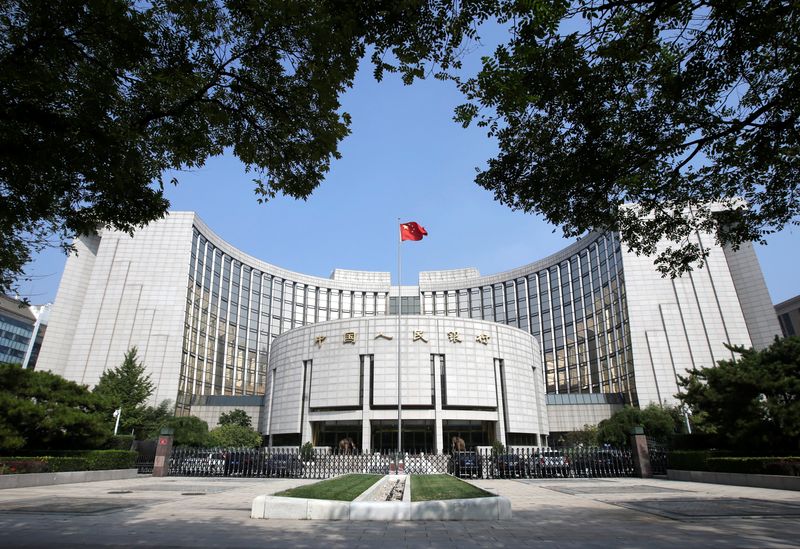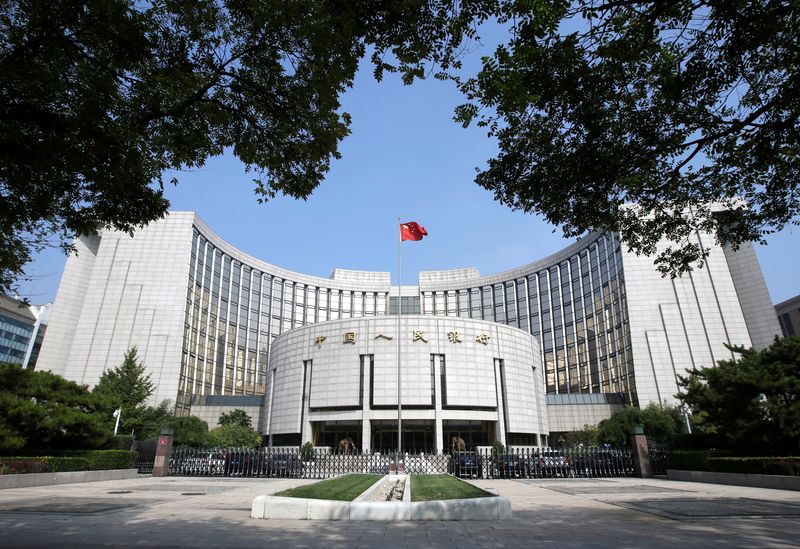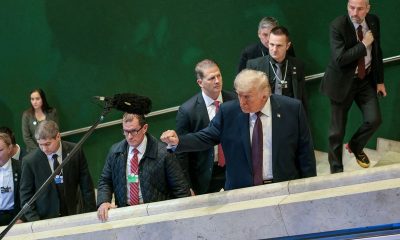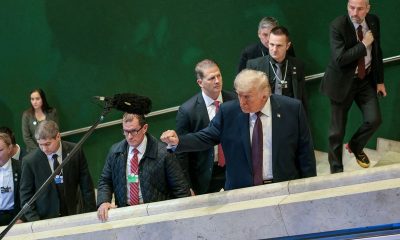Economy
China vows to coordinate support to resolve local government debt risks


© Reuters. FILE PHOTO: Headquarters of the People’s Bank of China (PBOC), the central bank, is pictured in Beijing, China September 28, 2018. REUTERS/Jason Lee/ File Photo
BEIJING (Reuters) – China will coordinate financial support to resolve local government debt problems, the central bank said in a statement on Sunday, as policymakers look to shore up an increasingly shaky economic recovery and reassure worried investors.
The statement, following a joint meeting on Friday by the People’s Bank of China (PBOC), the country’s top financial regulator and the securities regulator, comes amid growing concerns that China’s deepening property crisis is starting to spillover into its financial system.
China unexpectedly lowered several key interest rates earlier last week in a bid to shore up activity and it is expected to cut its prime loan rates on Monday, but analysts say moves so far have been too little, too late, with much more forceful measures needed to stem the economy’s downward spiral.
Financial departments should coordinate support to resolve local debt risks, enrich tools to prevent and resolve debt risks, strengthen risk monitoring and firmly hold the line on avoiding systemic risk, according to the PBOC statement.
China’s Politburo, a top decision-making body of the ruling Communist Party, in late July reiterated its focus on preventing local government debt risks and said it would carry out a basket of measures, but no plans have been announced yet.
Bloomberg reported on Aug. 11 that China will offer local governments a combined 1 trillion yuan ($137 billion) in bond issuance quotas for refinancing.
Analysts believe that a coordinated rescue package would likely involve a combination of additional funding or refinancing channels, debt swaps and payment extensions, and possible debt restructurings.
Debt-laden municipalities represent a major risk to China’s economy and financial stability, economists say, after years of over-investment in infrastructure, plummeting returns from land sales and soaring costs to contain COVID-19.
The finances of many local governments have deteriorated alongside a severe slump in the once-mighty property sector, which has caused a growing number of developers to default on their debts.
But Fitch Ratings said earlier this month it expects the central government will try to avoid outright bailouts of more troubled municipalities, as that would undermine policymakers’ years-long effort to bring debt levels down to more manageable levels.
The Friday meeting, attended by PBOC Governor Pan Gongsheng, deputy director of the National Financial Regulatory Administration Xiao Yuanqi, vice chairman of the China Securities Regulatory Commission Li Chao and other officials from financial departments, also urged banks to step up lending.
“Financial support to the real economy must be strong enough” while major banks should increase lending, the statement said.
The PBOC also reiterated that it will optimise credit policies for the property sector, and strongly support small firms, technology innovation and the manufacturing sector.
But analysts note many consumers and companies are in no mood to boost spending or borrowing given the extremely uncertain economic climate. New bank lending fell to a 14-year low in July.
($1 = 7.2800 renminbi)
Economy
Russian central bank says it needs months to make sure CPI falling before rate cuts -RBC


© Reuters. Russian Central Bank Governor Elvira Nabiullina attends a news conference in Moscow, Russia June 14, 2019. REUTERS/Shamil Zhumatov/File Photo
MOSCOW (Reuters) – Russia’s central bank will need two to three months to make sure that inflation is steadily declining before taking any decision on interest rate cuts, the bank’s governor Elvira Nabiullina told RBC media on Sunday.
The central bank raised its key interest rate by 100 basis points to 16% earlier in December, hiking for the fifth consecutive meeting in response to stubborn inflation, and suggested that its tightening cycle was nearly over.
Nabiullina said it was not yet clear when exactly the regulator would start cutting rates, however.
“We really need to make sure that inflation is steadily decreasing, that these are not one-off factors that can affect the rate of price growth in a particular month,” she said.
Nabiullina said the bank was taking into account a wide range of indicators but primarily those that “characterize the stability of inflation”.
“This will take two or three months or more – it depends on how much the wide range of indicators that characterize sustainable inflation declines,” she said.
The bank will next convene to set its benchmark rate on Feb. 16.
The governor also said the bank should have started monetary policy tightening earlier than in July, when it embarked on the rate-hiking cycle.
Economy
China identifies second set of projects in $140 billion spending plan


© Reuters. FILE PHOTO: Workers walk past an under-construction area with completed office towers in the background, in Shenzhen’s Qianhai new district, Guangdong province, China August 25, 2023. REUTERS/David Kirton/File Photo
SHANGHAI (Reuters) – China’s top planning body said on Saturday it had identified a second batch of public investment projects, including flood control and disaster relief programmes, under a bond issuance and investment plan announced in October to boost the economy.
With the latest tranche, China has now earmarked more than 800 billion yuan of its 1 trillion yuan ($140 billion) in additional government bond issuance in the fourth quarter, as it focuses on fiscal steps to shore up the flagging economy.
The National Development and Reform Commission (NDRC) said in a statement on Saturday it had identified 9,600 projects with planned investment of more than 560 billion yuan.
China’s economy, the world’s second largest, is struggling to regain its footing post-COVID-19 as policymakers grapple with tepid consumer demand, weak exports, falling foreign investment and a deepening real estate crisis.
The 1 trillion yuan in additional bond issuance will widen China’s 2023 budget deficit ratio to around 3.8 percent from 3 percent, the state-run Xinhua news agency has said.
“Construction of the projects will improve China’s flood control system, emergency response mechanism and disaster relief capabilities, and better protect people’s lives and property, so it is very significant,” the NDRC said.
The agency said it will coordinate with other government bodies to make sure that funds are allocated speedily for investment and that high standards of quality are maintained in project construction.
($1 = 7.1315 renminbi)
Economy
Russian central bank says it needs months to make sure CPI falling before rate cuts -RBC


© Reuters. Russian Central Bank Governor Elvira Nabiullina attends a news conference in Moscow, Russia June 14, 2019. REUTERS/Shamil Zhumatov/File Photo
MOSCOW (Reuters) – Russia’s central bank will need two to three months to make sure that inflation is steadily declining before taking any decision on interest rate cuts, the bank’s governor Elvira Nabiullina told RBC media on Sunday.
The central bank raised its key interest rate by 100 basis points to 16% earlier in December, hiking for the fifth consecutive meeting in response to stubborn inflation, and suggested that its tightening cycle was nearly over.
Nabiullina said it was not yet clear when exactly the regulator would start cutting rates, however.
“We really need to make sure that inflation is steadily decreasing, that these are not one-off factors that can affect the rate of price growth in a particular month,” she said.
Nabiullina said the bank was taking into account a wide range of indicators but primarily those that “characterize the stability of inflation”.
“This will take two or three months or more – it depends on how much the wide range of indicators that characterize sustainable inflation declines,” she said.
The bank will next convene to set its benchmark rate on Feb. 16.
The governor also said the bank should have started monetary policy tightening earlier than in July, when it embarked on the rate-hiking cycle.

 Forex4 years ago
Forex4 years agoForex Today: the dollar is gaining strength amid gloomy sentiment at the start of the Fed’s week

 Forex3 years ago
Forex3 years agoUnbiased review of Pocket Option broker

 Forex3 years ago
Forex3 years agoDollar to pound sterling exchange rate today: Pound plummeted to its lowest since 1985

 Forex3 years ago
Forex3 years agoHow is the Australian dollar doing today?

 Cryptocurrency3 years ago
Cryptocurrency3 years agoWhat happened in the crypto market – current events today

 World3 years ago
World3 years agoWhy are modern video games an art form?

 Commodities3 years ago
Commodities3 years agoCopper continues to fall in price on expectations of lower demand in China

 Economy3 years ago
Economy3 years agoCrude oil tankers double in price due to EU anti-Russian sanctions

























